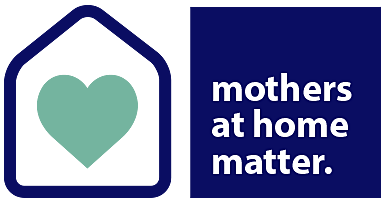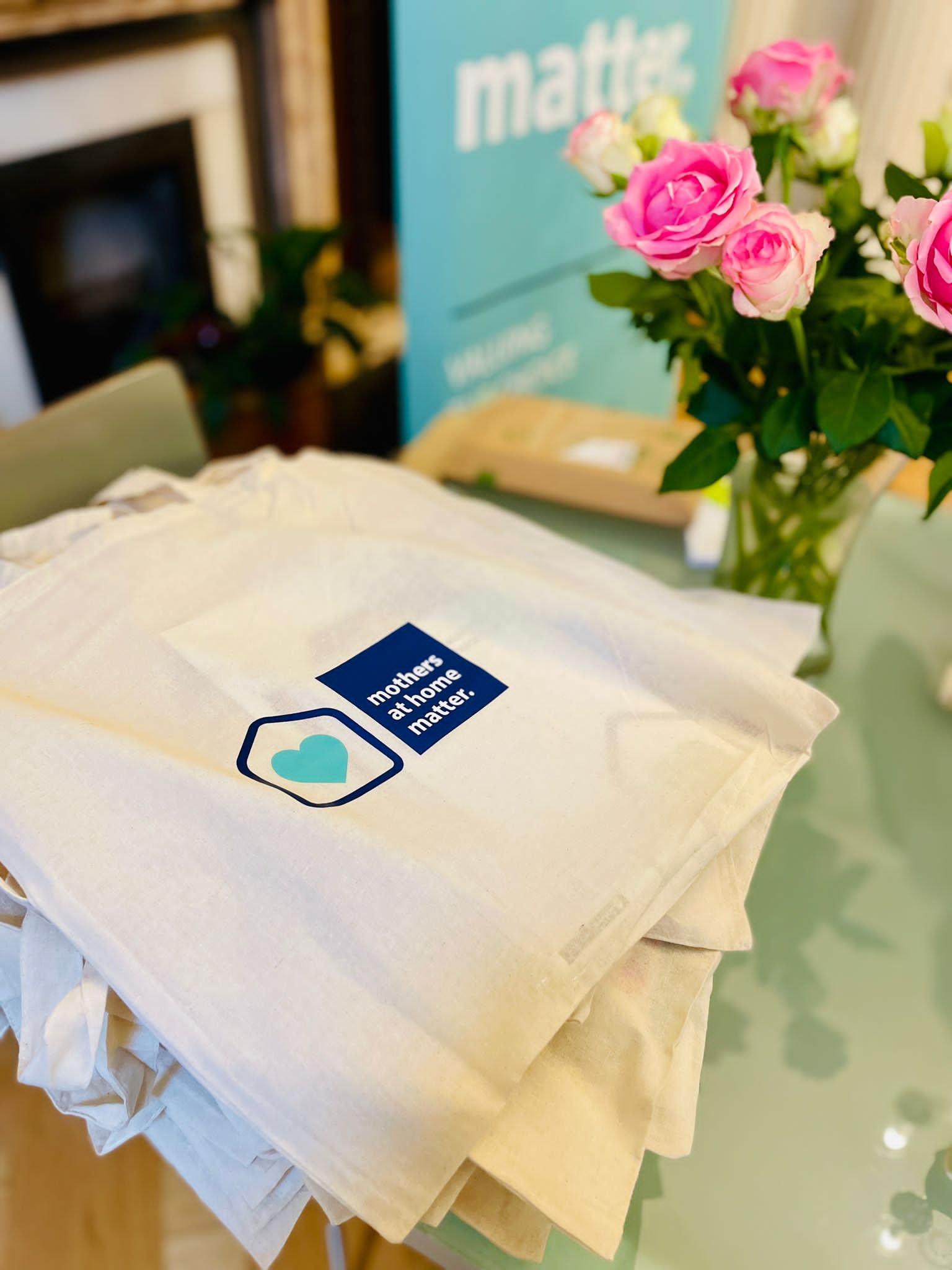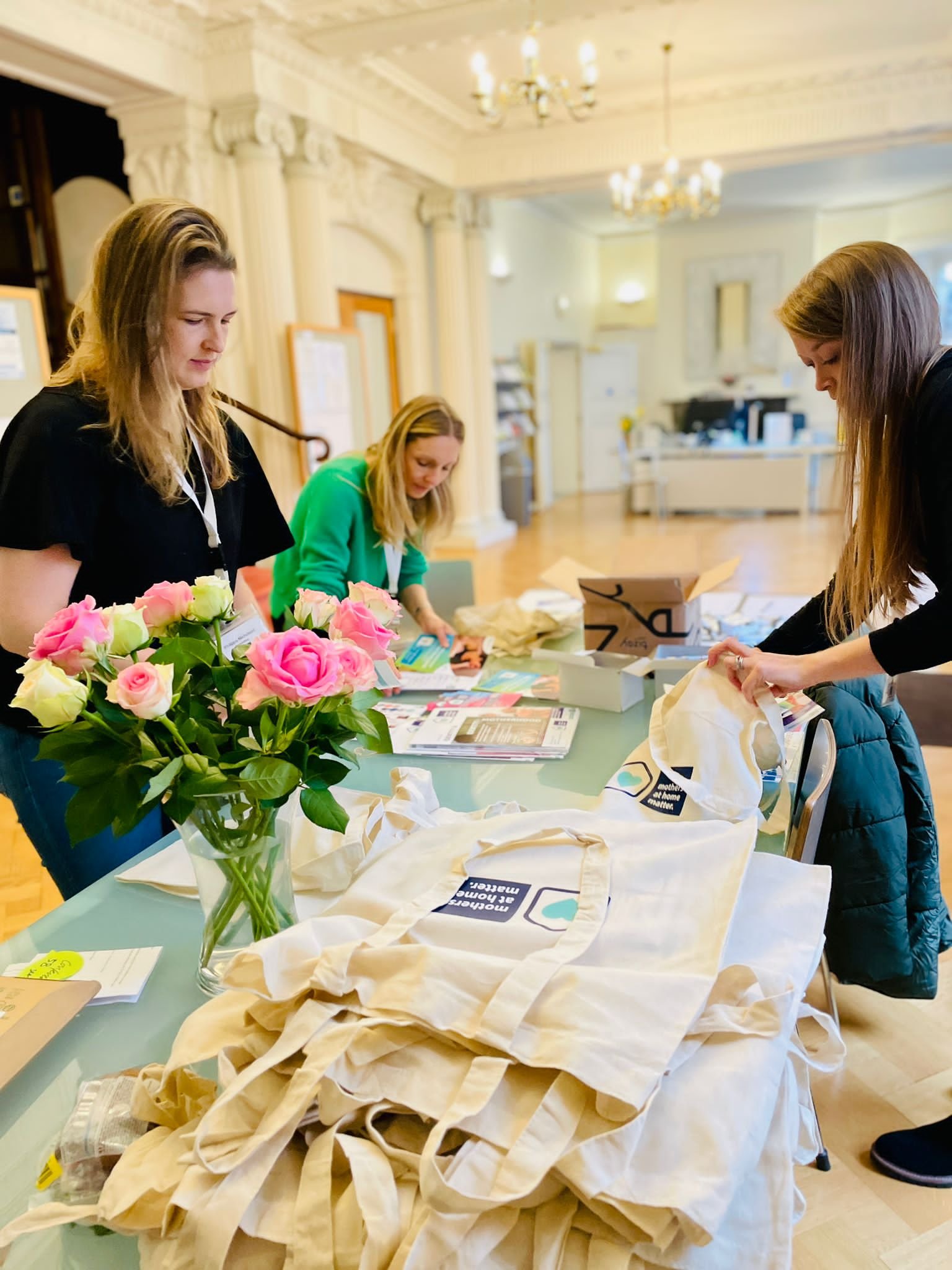Mothers At Home Matter Conference 2023
Identity and Motherhood.
Sally Greenhill was at our conference in November and reports back on a fantastic day.
If my mother, a war bride who had her first child in 1944, were asked about her identity as a young mother, it would have been a no-brainer: of course she was a Mum and Homemaker, following her husband across the world and caring for their four children on one middling professional salary. Her previous identities – as daughter, sister, friend or stenographer for a well-known bank, paled into insignificance when she became a Mother.
Not so for Kate Silverton, the keynote speaker at the 2023 Mothers at Home conference, who explained her own circumstances. She had recorded her speech the day before as she had to support her own mother in hospital on the day of the conference and had tied her hair in a bandanna as there wasn’t time to wash it: the reality of modern parenting in 2023! ‘This is how it is’, she explained – and she still looked marvellous! Kate had to choose between multiple identities: journalist and broadcaster, writer and child psychotherapist but eventually she landed on Mother as she explained that this was the most important job in the world. If you are asked at a party, ‘What do you do’, don’t be a coward and hide behind the last job you did before having children. Own up to being in the business of ‘brain development’ – which is what all good mothers do.
The reason why the question of Identity has become such a pressing issue this century is that new mothers are under huge pressures to ‘Have/Do It All’, i.e. pursue a high-profile professional career while still being a fantastic mother, wife etc. after both public and private support has been whittled away (e.g. Surestart). Kate Silverton decided that, with the birth of her second child, this was impossible: she couldn’t do it all. She was the prime breadwinner but she agreed with her husband that they would do without many material comforts in order for her to care for their children at home – which worked until Covid struck and her husband’s business disappeared overnight. Ever resourceful in her mid-40s, she decided to use this enforced downtime to write a childcare book, ‘There’s No Such Thing as Naughty’ after qualifying first as a child therapist.
“Own up to being in the business of ‘brain development’ – which is what all good mothers do.”
But, mindful of tired parents reading it late at night, Kate decided to try and simplify the idea of infant brain development by referring to the crucial areas of the brain, not by their scientific names (cerebellum, pre-frontal cortex, amygdala etc) which might be off-putting, but as cartoon characters: the Lizard (at the stem of the brain) the Baboon (half-way up ) and the Wise Owl at the top of the Baobab tree/brain, regarded as the Tree of Life in her birthplace, Zimbabwe. The Lizard is purely instinctive, over which the baby has no control, so any reference to the baby ‘playing up’ or ‘twisting mum round his little finger’ when he cries is totally erroneous; he is merely responding to internal stimuli, a cry for help. The Baboon helps to process and exorcise any traumatic experiences, with the mother’s help, rocking and soothing her baby, whilst the Wise Owl will eventually provide the ‘scaffolding for resilience’ which will enable the child to negotiate life’s inevitable future squalls.
Kate finished her talk by affirming, with conviction, that – yes – one can have it all eventually, but not all at the same time, and secondly, that it’s never too late to repair the damage of early parenting mistakes. But we must try and get the early years right for our children to grow up into empathic, sane, decent adults. FACT: parenting is the most important job in the world.
Our second keynote speaker was Liz Yeboah, mother to four sons aged 25 to 15 and one daughter, aged 10. Her talk was themed: The Joy of Teenagers (The Golden Years)
But how can she combine the words ‘joy ‘and ‘teenagers’ in the same sentence? YES, she can, she replies joyfully! Back to speak at a MAHM conference by popular demand, Liz shares her bubbly optimism and infectious giggle with us as to how she and her husband parent their teenage and young adult family – and makes it sound so easy. Married at 18 and sharing the woes of an ectopic pregnancy and a premature first baby, she has reached her mid-40s with a wealth of wisdom, using ‘community, teamwork, compassion, thoughtfulness, generosity, kindness, love, respect, faith, trust and support’ - wow! What are her top tips? Here they are, (helped by advice from her 17-year-old son, Levi.)
Let your children know that you love them unconditionally, from the moment they are born. If you had to throw yourself under a bus to save them, you would do it without a second thought. Say it, show it, demonstrate it.
Play the long game: prepare them for adolescence and adulthood from when they are about 8-10. Let them know what changes their bodies will go through (e.g. sprouting hair and BO), and that their hormones might make them want to slam doors and stomp upstairs. Girls can be prepared for the arrival of ‘Aunt Flo’ by giving them their first period kit well in advance and visiting www.auntflo.org Initiate conversations, share your own experience of being a teenager, open up about your own vulnerabilities.
Have family pow-wows, when jobs are allocated to each member of the family, according to their age and ability. Teach them to make their own beds properly. Read ‘Make Your Bed’ by William H. McRaven. Teach them to protect themselves, especially against sexual predators. Read ‘The Right Touch – Read Aloud’ by Sandy Kleven to younger kids. Teach them basic cooking skills, how to prepare simple, healthy, economical meals so that they can be useful husbands in future. Also, financial literacy.
Teach them good manners and a positive work ethic, to take responsibility for their actions and to perform their chores with a good attitude. (Easier said than done: how??) Explain that all households need jobs to be done if they are not going to descend into chaos, so each member has to share the load. Include the children in the discussion; parents are allowed to get in a strop too!
Try and enjoy being with your children so that they will want to be with you, too. Make your parenting style FUN, FAIR, FIRM. Doing things with your offspring should not be a burden.
Mentoring and coaching: guide your child(ren) through the perils of social media, especially pornography or any manipulative or addictive programs. Read novels to encourage a moral view on life. Use the Canopy filter to eliminate junk viewing, and control the WIFI via the router settings. Consult books like ‘The Tech-wise Family’ by Andy Crouch, or ‘Defend Young Minds, Protect Young Eyes’ on YouTube.
Parents are powerful influences on a growing child, so try to encourage them to become life-long self-educators. ‘Have fun, have fun, have fun!’ reiterates Liz. Work, play and love together. Cherish those precious years, your children are worth it.
Liz, aided and abetted by her son, Levi, would like to recommend these titles to teenagers and their parents:
Do Hard Things, by Steve Magness
The Survival Guide for Life, by Bear Grylls
The Seven Habits of Highly Effective Teenagers, by Sean Covey
Carry On, Mr Bowditch, by Jean Lee Latham
Our next speaker was Dr Carole Ulanowsky, who had done a PhD in the 1980s on ‘Changing Role Perceptions, An Intergenerational Study’. As a mother of four herself, and working part-time as an NCT ante-natal teacher, she was very interested in how 1970s mothering had changed by the 1990s. In the ‘70s, only about 3 in 10 mums of pre-school children planned to return to work, but by the ‘90s, the figure was nearer 7 in 10. Thatcherism was one contributor to this phenomenon, when the worker was valued over the individual and, of course, there was also the rise in educated, graduate women who didn’t want to lose their place in the career structure. ‘High-functioning’ women found it difficult to return to zero status after struggling up the career ladder. By the 1990s, second-wave feminism, individualism and consumerism had taken over – by which time many women had delayed starting a family, with all the physical implications of (failed) IVF attempts etc.
Carole’s next question was whether the 90s mothers, with more agency over when to become mothers than the 70s mothers, were in fact happier? Did choice ease their path? Her research in fact led to the answer NO! These mothers were equally constrained by social values, ideologies, and the balance of Parenthood to Personhood, in other words, the path to Self-fulfilment.
Carole had two more questions to explore:
Have babies’ primary needs changed?
Could babies be ‘reconstructed’ to fit into/adapt to the new ideology?
The scientific evidence says – again – NO! The emotional needs of babies and small children stay the same across time. As the scientific adviser for the charity, What About the Children? (WATCh?), Carole approaches scientists to write summaries – for a small fee – on any scientific research on the subject of infant development, for their website. And the science says that the bedrock of emotional security throughout life is formed in the first three years. Early experiences influence our brain’s architecture, which is one-quarter of its adult size at birth, rising to one-half by the end of the first year, and 80% by the end of the third year. Amazing! No wonder the first three years matter so much. To quote: ‘The brain is the crown jewel of the human body and its command centre’. We as a society must pay as much attention to this as to global warming and the spread of AI: not just the physical environment but our relational environment too.
Our final speaker after lunch, before the AGM, was a former President of MAHM, Sarah Douglas-Pennant, who had run her own Montessori school for the 2.5 to 7 year-old age group and had given birth to her first child in 1979, when it used to take a village to raise a child. Not any longer, sadly, with the return of so many mothers back into paid work, so the skills of mothering have been lost. We need to reverse the model and support mothers with raising their own families. She praised all those home-based mums at the conference for having the courage to buck the trend and stick by their convictions. MAHM must spread the messages that we have heard today and stand up to any accusation that they are not pulling their weight – ‘inactive citizens’, NO! Even if we make people feel guilty by doing the right thing, we should say, ‘I am a mother’ proudly, with conviction.
Sarah told us about her own family circumstances, as mother to two daughters with cystic fibrosis and a son with so-called dyslexia, which she later diagnosed as suffering from ‘retained primitive reflexes’, or developmental dyspraxia. This is when a child does not grow out of the infant tendency to ‘startle’, throwing out arms and legs involuntarily, which was discovered by Madeleine Portwood in the 1990s. Sarah’s son was written off at primary school as ‘uneducable’ but she knew he was not so she embarked on her own personal quest to educate him at home, using special exercises such as walking in a straight line and then backwards on his heels, to aid coordination. Madeleine Portwood found that about two-thirds of prison inmates have this problem, giving rise to a poor sense of self and frustration and humiliation. Only a mother has the love and tenacity to get to the bottom of the problem – and help her child – and by the time her son reached the Sixth Form, he was in the Oxbridge stream, but sadly died before he could take up his place.
It was agreed that the 2023 MAHM hybrid annual conference was highly successful with nearly 170 tickets sold, both to attend in person and online – the most so far. Committee member and conference organiser, Becca Woollgar, should be congratulated for all her efforts on producing such a fantastic line-up, and let’s hope that the zeitgeist on raising our children will change in our favour.
There is no more space to report on the multiple Questions or the AGM itself, except to put out a plea for more volunteers to support MAHM’s excellent work.
Sally Greenhill
Are you a member yet?
Join us today and enjoy member-benefits while helping us shout louder about valuing the choice to care.



